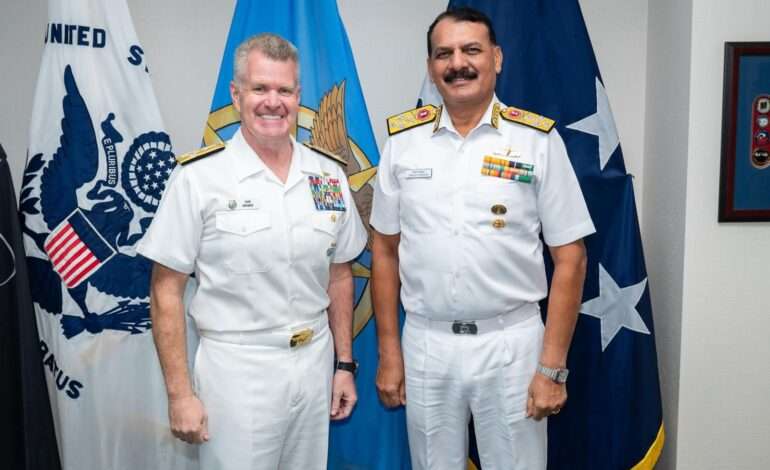
Indian Navy chief strengthens maritime cooperation, Indo-Pacific security ties during high-level U.S. visit
Indian Navy Chief Admiral Dinesh K. Tripathi held a series of high-impact engagements with senior U.S. military leaders this week, reaffirming the growing strategic convergence between India and the United States in the Indo-Pacific region. The discussions, held in Washington between November 12 and 17, underscored a shared commitment to strengthening maritime security, operational coordination, and defense cooperation amid rising challenges in the region.
During his visit, Admiral Tripathi met Admiral Samuel J. Paparo, Commander of the U.S. Indo-Pacific Command; Admiral Stephen T. Koehler, Commander of the U.S. Pacific Fleet; and Lieutenant General James F. Glynn, Commander of the U.S. Marine Forces Pacific. According to the Indian Navy, the interactions highlighted the “enduring partnership” between the two navies, grounded in mutual trust, shared democratic values, and a common vision for a free, open, inclusive, and rules-based Indo-Pacific.
Both sides conducted a comprehensive review of the key pillars of India–U.S. defense cooperation. Discussions focused on enhancing interoperability, expanding joint operational engagements, and bolstering maritime security across critical sea lanes. Officials also explored deeper collaboration through information sharing and Maritime Domain Awareness (MDA), including ongoing efforts under the Indo-Pacific Maritime Domain Awareness (IPMDA) initiative and linkages with India’s Information Fusion Centre–Indian Ocean Region (IFC-IOR).
As maritime threats evolve, the Indian and U.S. delegations deliberated on strengthening coordinated responses to humanitarian crises, disaster relief operations, counter-piracy missions, and non-traditional security challenges. The two sides also discussed safeguarding sea lines of communication and protecting undersea infrastructure—an emerging area of strategic concern.
A major highlight of the talks was the emphasis on expanding the scope and complexity of bilateral and multilateral naval exercises. Key engagements such as MALABAR, PASSEX, MILAN, and activities under the Combined Maritime Forces (CMF) are expected to see deeper integration, improved logistics coordination, and more advanced warfighting drills.
Recognizing the rapid evolution of maritime technology, the discussions also addressed cooperation in next-generation operational domains. These include unmanned systems, Intelligence, Surveillance and Reconnaissance (ISR), cyber operations, and space-enabled maritime capabilities—areas seen as critical for enhancing readiness and resilience at sea.
Admiral Tripathi’s visit reflects the broader momentum in India–U.S. defense relations and reinforces the central role of maritime cooperation in shaping the strategic landscape of the Indo-Pacific.